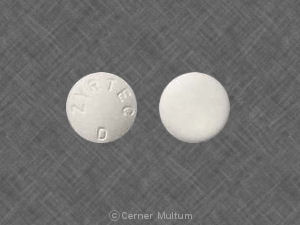Zyrtec-D Side Effects
Generic name: cetirizine / pseudoephedrine
Medically reviewed by Drugs.com. Last updated on Sep 5, 2025.
Note: This document provides detailed information about Zyrtec-D Side Effects associated with cetirizine / pseudoephedrine. Some dosage forms listed on this page may not apply specifically to the brand name Zyrtec-D.
Applies to cetirizine / pseudoephedrine: oral tablet extended release.
Precautions
The antihistamine in this medicine will add to the effects of alcohol and other CNS depressants including tricyclic antidepressants (medicines that slow down the nervous system, possibly causing drowsiness). Some examples of CNS depressants are other antihistamines or medicine for hay fever, other allergies, or colds; sedatives, tranquilizers, or sleeping medicine; prescription pain medicine or narcotics; barbiturates; medicine for seizures; muscle relaxants; or anesthetics, including some dental anesthetics. Examples of Tricyclic antidepressants are amitriptyline [e.g. Elavil], amoxapine [e.g. Asendin], clomipramine [e.g. Anafranil], desipramine [e.g. Pertofrane], doxepine [e.g. Sinequan], imipramine [e.g. Tofranil], nortriptyline [e.g. Aventyl], protriptyline [Vivactil], trimipramine [e.g. Surmontil]. Check with your doctor before taking any of the above while you are taking this medicine.
The antihistamine in this medicine may cause some people to become drowsy, dizzy, or less alert than they are normally. Make sure you know how you react to this medicine before you drive, use machines, or do anything else that could be dangerous if you are dizzy or are not alert.
Antihistamines may cause dryness of the mouth, nose, and throat. For temporary relief, use sugarless candy or gum, melt bits of ice in your mouth, or use a saliva substitute. However, if your mouth continues to feel dry for more than 2 weeks, check with your dentist. Continuing dryness of the mouth may increase the chance of dental disease, including tooth decay, gum disease, and fungus infections.
The decongestant in this medicine may cause some people to be nervous or restless or to have trouble in sleeping. If you have trouble in sleeping, take the last dose of this medicine for each day a few hours before bedtime. If you have any questions about this, check with your doctor.
Common side effects of Zyrtec-D
Some side effects of cetirizine / pseudoephedrine may occur that usually do not need medical attention. These side effects may go away during treatment as your body adjusts to the medicine. Also, your health care professional may be able to tell you about ways to prevent or reduce some of these side effects.
Check with your health care professional if any of the following side effects continue or are bothersome or if you have any questions about them:
More common side effects
- sleepiness or unusual drowsiness, extreme tiredness
Less common side effects
- dry mouth
- weakness
Rare side effects
- dizziness
- sore throat
Serious side effects of Zyrtec-D
Along with its needed effects, cetirizine/pseudoephedrine may cause some unwanted effects. Although not all of these side effects may occur, if they do occur they may need medical attention.
Get emergency help immediately if any of the following symptoms of overdose occur while taking cetirizine / pseudoephedrine:
Symptoms of Overdose
- changes in mood, irrational behavior, depersonalization hallucinations
- convulsions (seizures)
- extreme sleepiness or unusual drowsiness
- fast, slow, pounding, or irregular heartbeat or pulse
- feeling anxious
- giddiness
- headache
- irritability
- muscle weakness or tenderness
- nausea
- restlessness
- shallow, irregular, fast, or slow breathing
- sleeplessness or trouble in sleeping
- abdominal and/or chest pain
- thirst
Check with your doctor as soon as possible if any of the following side effects occur while taking cetirizine / pseudoephedrine:
Rare side effects
- Breathing, troubled
- back, leg, or stomach pain
- blurred vision
- bloody, cloudy, or dark urine, sudden decrease in amount of urine
- black, tarry stools, diarrhea, light-colored stools
- confusion
- dizziness, feeling faint, or lightheaded
- fever or chills
- increased blood pressure
- rapid weight gain
- skin rash or hives
- swelling of face, mouth, throat, fingers, glands, feet, and/or lower legs
- stillbirth
- twitching, twisting, or uncontrolled repetitive movements of the face
- sudden sweating
- vomiting blood, bleeding gums, nosebleeds, unusual bleeding or bruising
- pale or yellow eyes or skin
- unusual tiredness or weakness
See also:
For healthcare professionals
Applies to cetirizine / pseudoephedrine: oral tablet extended release.
General adverse events
The manufacturer has not provided adverse event information.[Ref]
References
1. (2001) "Product Information. Zyrtec-D (cetirizine-pseudoephedrine)." McNeil Consumer Healthcare
More about Zyrtec-D (cetirizine / pseudoephedrine)
- Check interactions
- Compare alternatives
- Pricing & coupons
- Reviews (6)
- Drug images
- Dosage information
- During pregnancy
- Drug class: upper respiratory combinations
- En español
Patient resources
Other brands
Professional resources
Other brands
Allergy Relief D, Wal-Zyr D, All Day Allergy-D
Other formulations
Related treatment guides
Further information
Zyrtec-D side effects can vary depending on the individual. Always consult your healthcare provider to ensure the information displayed on this page applies to your personal circumstances.
Note: Medication side effects may be underreported. If you are experiencing side effects that are not listed, submit a report to the FDA by following this guide.

